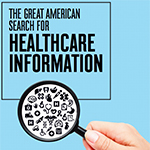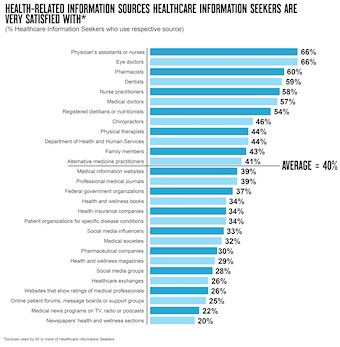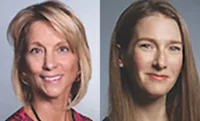 |
The appetite for healthcare information among American consumers continues to rise, according to a new study from Weber Shandwick and KRC Research, but their trust in the information they receive is not keeping pace.
Nearly three-quarters of the 1,700 adults surveyed (73 percent) said that they obtain health-related information from the Internet, a considerable uptick from the 59 percent who gave the same answer in a 2013 study from Pew Research Center’s Internet & American Life project.
In addition, 55 percent of respondents identified as Healthcare Information Seekers (those who look for health-related information at least once a year) said that they were relying more on the internet for that information than they did five years ago.
|
Health-Related Information Sources Healthcare Information Seekers Are Very Satisfied With (enlarge) |
Among the benefits respondents attributed to the boom in healthcare information were the ability to fact-check information (54 percent), the ease with which information can be found (54 percent) and the amount of information that be found on any topic (50 percent).
But when it comes to reliability, consumers are skeptical. For example, while two-thirds (67 percent) of Healthcare Information Seekers say they find health information on social media, 83 percent of them voice concerns about incorrect or misleading information.
That skepticism cuts across generational lines. Gen Z respondents were actually more concerned about inaccurate information from social media sources (91 percent) than were Boomers (87 percent). The study’s authors say this shows that content or channels are the challenge for communicators, rather than social media familiarity or proficiency.
What is the source for much of the most satisfactory information? Medical professionals. Physician’s assistants or nurses and eye doctors were the most trusted, with 66 percent of respondents saying they were very satisfied with information they received from those sources. But all catgories of medical professionals (dentists, doctors, chiropractors, etc.) topped the study average of 40 percent.
Because of this, the study’s authors suggest that putting medical professionals behind content is one way to increase trust in the healthcare information provided to consumers across various channels. Using clear language in communications and employing research to understand audience needs are among the other strategies they suggest.
“Healthcare companies need to realize the proliferation of misinformation and lack of trust online is actually an opportunity,” said Weber Shandwick executive vice president and global director of digital health Stacey Bernstein. “As some of the most information-rich, research-driven organizations in the world, they are poised perhaps better than anyone else to provide the credible and relevant information that consumers are so actively seeking.”



 Lo Isidro, senior director at Real Chemistry with more than a decade of strategic communications and PA experience, has joined Narrative Strategies.
Lo Isidro, senior director at Real Chemistry with more than a decade of strategic communications and PA experience, has joined Narrative Strategies. Nelson Fernandez, former North American chair of APCO Worldwide and managing director of Burson-Marsteller, has joined Volunteers in Medicine Berkshires as director of communications and PA.
Nelson Fernandez, former North American chair of APCO Worldwide and managing director of Burson-Marsteller, has joined Volunteers in Medicine Berkshires as director of communications and PA. Lilit Bargar, who was most recently an EVP in the healthcare practice at Weber Shandwick, comes on board at GCI Health as EVP, corporate practice lead.
Lilit Bargar, who was most recently an EVP in the healthcare practice at Weber Shandwick, comes on board at GCI Health as EVP, corporate practice lead.
 Five ways that successful thought leaders are made.
Five ways that successful thought leaders are made.


 Have a comment? Send it to
Have a comment? Send it to 
No comments have been submitted for this story yet.